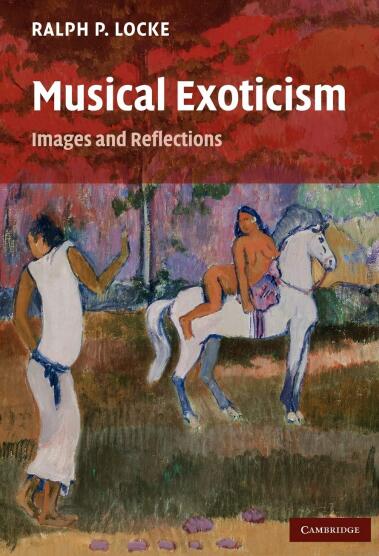Musical Exoticism:Images and Reflections
著 者:Ralph P. Locke
出版社:Cambridge University Press
出版时间:2009年
ISBN号:978-0-521-34955-0
页 数:421页
索书号:J60/L955
所在库室:锦江校区图书馆9楼教参阅览室1册
内容简介:
A Japanese geisha, a Middle Eastern caravan, a Hungarian-'Gypsy' fiddler, Carmen flinging a rose at Don José - portrayals of people and places that are considered somehow 'exotic' have been ubiquitous from 1700 to today, whether in opera, Broadway musicals, instrumental music, film scores, or in jazz and popular song. Often these portrayals are highly stereotypical but also powerful, indelible and touching - or troubling. Musical Exoticism surveys the vast and varied repertoire of Western musical works that evoke exotic locales. It relates trends in musical exoticism to other trends in music, such as programme music and avant-garde experimentation, as well as to broader historical developments such as nationalism and empire. Ralph P. Locke outlines major trends in exotic depiction from the Baroque era onward, and illustrates these trends through close study of numerous exotic works, including operas by Handel and Rameau, Mozart's 'Rondo alla turca', 'Madame Butterfly' and 'West Side Story'.
目录:
Introduction
1 Music,the world, and the critic
2 Questions of value
3 Exoticism with and without exotic style
4 Who is “Us”? The national and / as the exotic, and the treatment of stereotypes
5 Baroque portrayals of despots:ancient Babylon, Incan Peru
6 A world of exotic styles, 1750-1880
7 Exotic operas and two Spanish Gypsies
8 Imperialism and “the exotic Orient”
9 Exoticism in a modernist age(c.1890-1960)
10 Exoticism in a global age(c.1960 to today)
11 Epilogue:exotic works of the past, today
评价:
"Depictions of Turkish pashas, Spanish gypsies, and of amusing or threatening foreigners are very familiar to musicians and audiences, yet Ralph P. Locke is the first critic to confront this enormous repertoire as a major phenomenon in Western music. The range - from Baroque opera to jazz - is vast, and the ethical and political issues are more relevant today than ever. Locke's penetrating study explores the manifold implications of evoking exotic cultures in music, and offers insights that force us to rethink many of our most firmly held assumptions."
——Hugh Macdonald, Avis H. Blewett Professor of Music, Washington University, St. Louis
"In this ambitious and challenging monograph, Ralph Locke proves himself to be an extremely expert guide to that musical Elsewhere that we all know but little understand, whether it be the multiple locations of Rameau's Les Indes galantes, the Turkey of Mozart's Die Entführung aus dem Serail, the Sri Lanka of Bizet's Les pêcheurs de perles, the neighbourhood Otherness of Bernstein's West Side Story, or the journey from Venice to China undertaken by Tan Dun's Marco Polo."
——David Nicholls, Professor of Music, University of Southampton
"In this book, Ralph Locke offers a comprehensive and probing examination of musical exoticism in diverse musical repertoires that range from Rameau to Algerian Rap. He effectively bridges the gap between cultural and musical analyses of exoticism by grounding stylistic traits and paradigms to specific ideologies (colonialism, imperialism, Orientalism, and globalization) and cultural contexts. In demonstrating how western audiences' understanding of exoticism is mediated by cultural preconceptions and "situated" knowledge, Locke carefully negotiates the multiple subject positions and social forces that have shaped its discursive practice."
——Yayoi Uno Everett, Associate Professor, Music Department, Emory University

